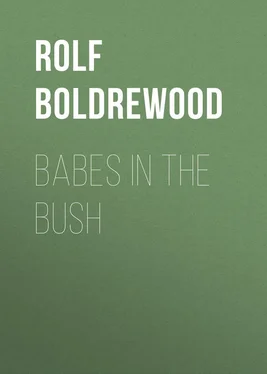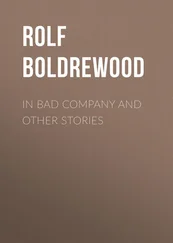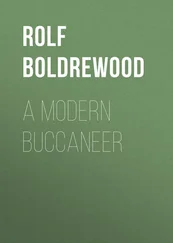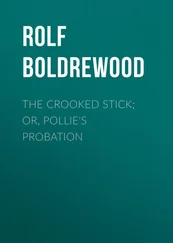Rolf Boldrewood - Babes in the Bush
Здесь есть возможность читать онлайн «Rolf Boldrewood - Babes in the Bush» — ознакомительный отрывок электронной книги совершенно бесплатно, а после прочтения отрывка купить полную версию. В некоторых случаях можно слушать аудио, скачать через торрент в формате fb2 и присутствует краткое содержание. Жанр: foreign_antique, foreign_prose, на английском языке. Описание произведения, (предисловие) а так же отзывы посетителей доступны на портале библиотеки ЛибКат.
- Название:Babes in the Bush
- Автор:
- Жанр:
- Год:неизвестен
- ISBN:нет данных
- Рейтинг книги:4 / 5. Голосов: 1
-
Избранное:Добавить в избранное
- Отзывы:
-
Ваша оценка:
- 80
- 1
- 2
- 3
- 4
- 5
Babes in the Bush: краткое содержание, описание и аннотация
Предлагаем к чтению аннотацию, описание, краткое содержание или предисловие (зависит от того, что написал сам автор книги «Babes in the Bush»). Если вы не нашли необходимую информацию о книге — напишите в комментариях, мы постараемся отыскать её.
Babes in the Bush — читать онлайн ознакомительный отрывок
Ниже представлен текст книги, разбитый по страницам. Система сохранения места последней прочитанной страницы, позволяет с удобством читать онлайн бесплатно книгу «Babes in the Bush», без необходимости каждый раз заново искать на чём Вы остановились. Поставьте закладку, и сможете в любой момент перейти на страницу, на которой закончили чтение.
Интервал:
Закладка:
‘Bedad! I don’t know. I’d say the reality was nearer where we are, with all the disadvantages of good dinners, good sport, good books, and good company. But you’re right, me dear fellow, to put a bold face on it; and if you have to take the shilling in the divil’s regiment, sure ye’ll die a hero, or rise to Commander-in-Chief, if I know ye. But your mother, and poor Miss Effingham, and the Captain – without his turnips and his justice-room and his pointers and his poachers, his fibulæ and amphoræ – whatever will he do among blackfellows and kangaroos? My heart aches for ye all, Wilfred. Sure ye know it does. If ye won’t take any more potheen, let us sleep on it; and we’ll have a great day among the cocks, if we live, and talk it over afterwards. There never was that sorrow yet that ye didn’t lighten it if ye tired your legs well between sun and sun!’
With the morrow’s sun came an unwonted calm and settled resolve to the soul of Wilfred Effingham. Together, gay, staunch Gerald O’More and he took the last day’s sport they were likely to have for many a day. The shooting was rather above than under the average, as if the ruined heir was willing to show that his nerves had not been affected by his prospects.
‘I must take out the old gun,’ he said, ‘and keep up my shooting. Who knows but that we may depend upon it for a meal now and then in this New Atlantis that we are bound for. But one thing is fixed, old fellow, as far as a changeable nature will permit. I shall have to be the mainstay of my father’s house. I must play the man, if it’s in me. No more dilettantism, no more mediæval treasures, no more tall copies. The present, not the past, is what we must stand or fall by. The governor is shaken by all this trouble; not the best man of business at any time. My dear mother is a saint en habit de Cour ; she will have to suffer a sea-change that might break the hearts of ordinary worldlings. Upon Rosamond and myself will fall the brunt of the battle. She has prepared herself for it, happily, by years of unselfish care and thought. I have been an idler and a loiterer. Now the time has come to show of what stuff I am made. It will mean good-bye to you, Gerald O’More, fast friend and bon camarade . We shall have no more shooting and fishing together, no more talk about art and poetry, no more vacation tours, no more rambles, for long years – let us not say for ever. Good-bye to my old life, my old Self! God speed us all; we must arm and away.’
‘I’d say you might have a worse life, Wilfred, though it will come hard on you at first to be shooting kangaroos and bushrangers, instead of grouse and partridges, like a Christian. But we get used to everything, I am told, even to being a land-agent, with every boy in the barony wondering if he could tumble ye at sixty paces with the ould duck gun. When a thing’s to be done – marrying or burying, standing out on the sod on a foggy morning with a nate shot opposite ye, or studying for the law – there’s nothing like facing it cool and steady. You’ll write me and Hallam a line after you’re landed; and we’ll think of ye often enough, never fear. God speed ye, my boy! Sure, it’s Miss Annabel that will make the illigant colonist entirely.’
The friends parted. Wilfred lost no time in reaching home, where his presence comforted the family in the midst of that most discouraging state of change for the worse, the packing and preparing for departure.
But he had utilised the interval since he left his friend by stern self-examination, ending in a fixed, unalterable resolve. His mother, his sisters, and his father were alike surprised at his changed bearing. He had grown years older in a week. He listened to the explanation of their misfortune from his father with respectful silence or short, undoubting comment. He confirmed the decision to which the family counsel had arrived. Emigration to Australia was, under the circumstances, the only path which promised reparation of the fortunes of the house. He carefully read the letter from Mr. Sternworth, upon which their fate seemed to hang. He cheered his mother by expressing regret for his previous desultory life, asking her to believe that his future existence should be devoted to the welfare of all whom both held so dear.
‘ You have never doubted, my dearest mother,’ he said, ‘but that your heedless son would one day do credit to his early teaching? I stand pledged to make your words good.’
The arrival of the heir, who had taken his place at his father’s right hand in so worthy a spirit, seemed to infuse confidence into the other members of the family. Each and all appeared to recognise the fact that their expatriation was decided upon, and while lamenting their loved home, they commenced to gather information about their new abode, and to dwell upon the more cheering probabilities.
The family was not a small one. Guy Effingham was a high-spirited schoolboy of fourteen, whose cricket and football engagements had hitherto, with that amount of the humanities which an English public schoolboy is compelled to master, under penalties too dire for endurance, been sufficient to fill up his irresponsible life. It was arranged that he was to remain at school until the week previous to their departure. His presence at home was not necessary, while his mother wished him to utilise the last effective teaching which he was likely to have. To her was committed the task of preparing him for his altered position. Two younger daughters, with a boy and girl of tender years, the darlings of the family, completed the number of the Effinghams. The third daughter, Annabel, was the beauty of the family. A natural pride in her unquestioned loveliness had always mingled with the maternal repression of all save the higher aims and qualities which it had been the fond mother’s life-long duty to inculcate. Annabel Effingham had received from nature the revival of the loveliness of some ancestress, heightened and intensified by admixture of family type. She was fair, with the bright colouring, the silken hair, the delicate roseate glow which had long been the boast of the women of her mother’s family – of ancient Saxon blood – for many generations. But she had superadded to these elements of beauty a classical delicacy of outline, a darker shade of blue in the somewhat prouder eye, a figure almost regal in the nobility of carriage and unconscious dignity of motion, which told of a diverse lineage. Beatrice, the second daughter of the house, had up to the present time exhibited neither the strong altruistic bias which, along with the faculty of organisation, characterised Rosamond, nor the universally confessed fascination which rendered Annabel’s path a species of royal progress. Refined, distinguished in appearance, as indeed were all the members of the family, she had not as yet developed any special vocation. In her appearance one saw but the ordinary traits which stamp a highly cultured girl of the upper classes. She was, perhaps, more distinctly literary in her tastes than either of her sisters, but her reserved habits concealed her attainments. For the rest, she appeared to have made up her mind to the inevitable with less apparent effort than the other members of the family.
‘What can it avail – all this grieving and lamenting?’ she would say. ‘I feel parting with The Chase, with our relations and friends – with all our old life, in fact – deeply and bitterly. But that once admitted, what good end is served by repeating the thought and renewing the tears? Other people are ruined in England, and have to go to Boulogne and horrid continental towns, where they lead sham lives, and potter about, unreal in everything but dulness and poverty, till they die. We shall go to Australia to do something – or not to do it. Both are good in their way. Next to honest effort I like a frank failure.’
Читать дальшеИнтервал:
Закладка:
Похожие книги на «Babes in the Bush»
Представляем Вашему вниманию похожие книги на «Babes in the Bush» списком для выбора. Мы отобрали схожую по названию и смыслу литературу в надежде предоставить читателям больше вариантов отыскать новые, интересные, ещё непрочитанные произведения.
Обсуждение, отзывы о книге «Babes in the Bush» и просто собственные мнения читателей. Оставьте ваши комментарии, напишите, что Вы думаете о произведении, его смысле или главных героях. Укажите что конкретно понравилось, а что нет, и почему Вы так считаете.












